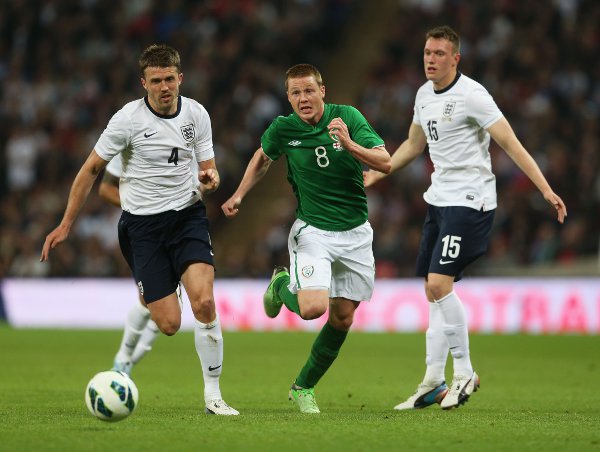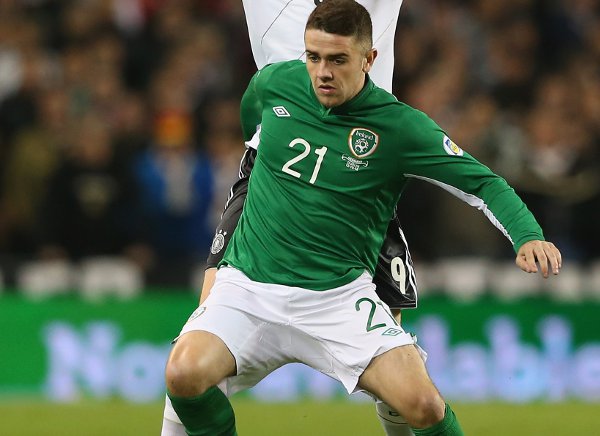YOUR name is Noel King. You are 57 years old, just handed one of the most pressurised jobs in Irish sport and yet you can walk down the main street of any Irish town and remain unrecognised.
You have spent 35 years of your life working as a coach without ever seeing your head appear above the parapet. You’ve never been unemployed but yet, for all the work you’ve had, there has never been a job like this.
Last week, you spoke to Stephen Ireland, Anthony Stokes and Darron Gibson, this week to the media. You are Ireland manager — probably only for two games, but still, after a lifetime working in the League of Ireland, then in women’s football, then as Ireland’s Under 21 manager, you know you’ve arrived.
You know because the phone never stops ringing. You’re in demand. Your employers fix you up with a new phone and you get to work, to Stoke one night, Tranmere the next. You’ve spent a lifetime waiting to be an overnight sensation and you won’t sleep easily worrying about the pressure.
Next month, you play Germany, three times World Cup winners, three times European champions, Germany who came to Dublin last year and scored six times while Ireland scored once, Germany who humiliated one of the greatest coaches of modern times, Giovanni Trapattoni, and who now will look at you, Noel King, standing in the opposite dug-out.
You know all this rigmarole is temporary. “I’m a realist,” you say. But you’re proud because you know the road you’ve taken, getting your first coaching badges at 17, getting your first job at 22, as director of football at Home Farm.
You remember what happened since, the roles at Shamrock Rovers and Derry City, the technical director’s job at the FAI when Jack Charlton was there, the manager of the Irish women’s team.
“A lot of people are proud for me,” you say. “They know I have come through a long apprenticeship and that I don’t want to disappoint those people. We want to show that we — coming from Ireland and living and working here — can do the job.”
And deep down — despite your modesty, despite your humble origins — you can do it because all your life, the only thing you have done is coach and manage.
 Ireland midfielder James McCarthy is a firm fan of King's
Ireland midfielder James McCarthy is a firm fan of King's“When I started, at 17, 18, coaching wasn’t the done thing then. It wasn’t accepted, wasn’t very hip. Most of the teams I played in, the lads weren’t into coaching.
“We were fighting to be heard, people like myself, Brian Kerr, Noel O’Reilly, Tom Flanagan, because we believed in coaching. And there would have been a bit of resistance to our beliefs. But as time has gone on, we’ve been listened to.
Our argument was that a pianist can only improve if taught. The same thing must apply to soccer. You had to prove that teams with coaches would become successful. As that happened, other people took it on.
Still, I don’t know if there are that many students of coaching today. There is a difference between that and people who studied to get qualified because that is the only way to get a job.”
In the troubled and blundering history of Irish soccer, men like Noel King and Brian Kerr are rarities, visionaries who could see a light in the dark, who travelled to countries like Holland and Croatia to observe their coaching trends and figure out how Ireland would be a better place with those ideas imported.
Kerr, scandalously, has been ignored by the FAI for eight years. King’s voice, though, gets heard. He plays the political game. Yet he’s much more than a hail-fellow-well-met type of bloke. He’s sincere too. And he knows how to man-manage.
It was King who picked up the phone to Robbie Brady in August 2011 and ignored the club versus country debate which had stopped Brady representing the Irish Under 19s in the European Championships the summer before.
“If you can’t get excited watching someone like Robbie Brady then there is something wrong with you,” he says. Brady is now a regular with the seniors. Yet he could have been lost.
 Robbie Brady will no doubt feature in King's plans
Robbie Brady will no doubt feature in King's plansSo too could James McCarthy. Having been publicly criticised by Trapattoni and Robbie Keane, McCarthy spent the summer of 2011 being chased by Scotland.
And King, subtly, went about his business, cheerily phoning McCarthy one day at his home, telling him how much he’d enjoy working with a player like him, a player he recognises as someone who respects the game, who is a great asset to our country, who can go as far in football as luck will take him.
“Noel was different class to me. When he rang, the first thing I said, was, ‘Okay see you Monday so,’” said McCarthy.
And so the peacemaker had two ballplayers. That’s man-management in the modern game, a bit of cajoling mixed with flattery.
So when another call was made — this time from John Delaney to King, this time to offer him the interim Irish managerial job — a thought struck him. This was like a lifetime achievement award, except that he wasn’t ill and wasn’t retired. Instead, he is ready.
He knows the challenge ahead is huge. Even in the short-term — with nothing really at stake — he knows he has a reputation to protect. Lose heavily and the criticism will be merciless. Achieve and, well, who knows? These two games against the Germans and Kazakhs amount to a lengthy job interview.
So what can we expect from this jovial Dubliner?
In outlook and behaviour, he’ll be bubbly, firmly believing in a laugh and a joke to help guys relax. He’ll more than likely turn to Brady and McCarthy, not out of loyalty but out of the belief they have what it takes to trouble the Germans.
And when it comes to tactics, he’ll stick with the 4-2-3-1 system which has become his obsession since he was appointed Under 21 boss three years back.
“On one level, I’m not a big believer that tactics decide games. Players do, not systems or managers. But 4-2-3-1, when it works, can be very effective. You can have extra numbers in midfield, extra on the wings, extra in attack. That is when it is a joy to watch. At times, if it isn’t working, you can fret a bit.
“You need a plan, though, because when you play the international game in Europe, you are forced to think. You are coming up against top-notch coaches. The German, Dutch or Italian way of doing things has influenced so many people.
“So you need to have a system. Anyone who says otherwise, I completely disagree with. I know the game is about passing, control, talking — but it is also about maximising the talent you have. That is what systems do. If you can employ a better system than your opponent, then you can alter results.
“I’d have theoretical debates with other coaches about tactics and stuff like that because in those debates you are challenging your mind and considering other options. But when the whistle blows, you need to be comfortable with what you want to do. As a coach, you’ve got to take the final say. You stand or fall on your call, your tactics. I have changed my systems completely over time,
4-2-4, 4-1-4-1, 4-5-1. But 4-2-3-1 allows fluidity. The mentality of the two holding guys in midfield is the key to everything. Fans who believe the game has to be about attacking, attacking, attacking must be aware that if you leave big gaps, you will get slaughtered.
“The modern game is all about the counterattack. And when you are under attack, you have to look after your house. In the old days, your house was the back four. Now, to look after your back-four, you need defensive midfielders screening. Very few people don’t do it around Europe.”
And this guy will be no different — even if he will only be King for a day.

